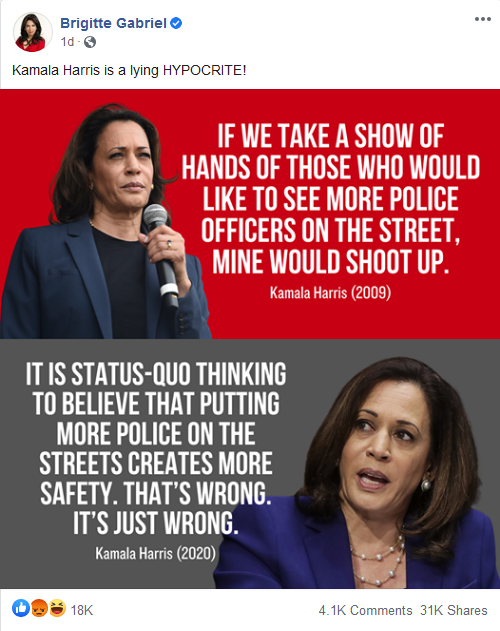Shortly after U.S. Democratic presidential candidate Joe Biden named Sen. (and former California Attorney General) Kamala Harris as his running mate in August 2020, social media users began circulating a meme purportedly showing two contradictory statements Harris had made about the value of having more police on the streets, along with commentary painting Harris as a "lying hypocrite":
In a strictly literal sense, the meme correctly attributes to Harris two contrasting statements she made 11 years apart, as The New York Times noted in an August 2020 article about Harris' viewpoint on police misconduct:
In her 2009 book, “Smart on Crime,” she wrote that “if we take a show of hands of those who would like to see more police officers on the street, mine would shoot up,” adding that “virtually all law-abiding citizens feel safer when they see officers walking a beat.”
Earlier this summer, in the wake of the police killing of George Floyd in Minneapolis, she told The New York Times that “it is status-quo thinking to believe that putting more police on the streets creates more safety. That’s wrong. It’s just wrong.”
Whether those contrasting statements document Harris to be a "liar" or a "hypocrite" is a thornier question, however. Altering one's viewpoint about an issue over the course of many years is not necessarily hypocritical, especially if such evolution is based on additional knowledge and experience and/or shifting conditions -- it's only hypocritical if a given viewpoint is an insincere one, expressed for purposes of political expediency rather than genuine belief. In 2009, Harris was district attorney of San Francisco, but by 2020, she had served a six-year tenure as California's attorney general and was well into her fourth year as a U.S. senator. Certainly occurrences that took place, and the experience she accumulated, during that 11-year span might have prompted a change in her thinking.
As well, it's important to note the context in which Harris made those statements. The first was taken from her 2009 book “Smart on Crime,” in a chapter that was specifically about the evolution of methods for fighting crime. The chapter was titled "Myth: The tools of crime fighting never change" and opened with the statement that "the secret of successfully reducing crime is that there is no one secret to successfully reducing crime," so Harris was arguing against a status quo approach and emphasizing the need for measuring how effectively police were actually making communities safer (rather than merely creating the appearance of safety):
On one hand, if we take a show of hands of those who would like to see more police officers on the streets, mine would shoot up. A more visible and strategic police presence is a deterrent to crime, and it has a positive impact on a community. Virtually all law-abiding citizens feel safer when they see officers walking a beat. This is as true in economically poor neighborhoods as in wealthy ones. Police officers are a reassuring sign of a community's commitment to order, calm, and safety. More beat cops means more rapid response to assaults, traffic crimes, and robberies and has a profound effect on reducing quality-of-life crimes by simple presence.
But in addition to putting more police on the street, we have to look at the way officers are being deployed and how we measure whether they are achieving the goal of creating a safer community.
Her second statement came in the midst of nationwide protests spurred by the police custody death of George Floyd in Minneapolis in May 2020, when long-simmering issues of police violence and the treatment of Blacks by police came to a boil -- all while the U.S. was grappling with a nationwide shutdown due to the COVID-19 coronavirus disease pandemic. At that point, many Americans decidedly did not hold to the notion that the increased presence of police made them safer (or made them feel safer) and gave rise to "defund the police" movements. It was in that context that Harris responded to a question about police by asserting that "status quo thinking" was wrong and that "we have to reimagine what public safety looks like":
Q: Can I ask you about this idea of defunding the police? What’s your thinking on that idea?
A: Well, it’s a concept. We do have to reimagine what public safety looks like. And here’s the thing. It is status quo thinking to believe that putting more police on the streets creates more safety. That’s wrong. It’s just wrong. You know what creates more safety? Funding public schools, affordable housing, increased homeownership, job skill development, jobs, access to capital for those who want to start small businesses, or who are running small businesses in communities.
But, no, we’re not going to get rid of the police. We all have to be practical. But let’s separate out these discussions.
Many cities in our country spend one-third of their entire budget on policing. With all the responsibilities those cities have, one-third on policing? Put it in the context of the fact that over the last many decades, we have essentially been defunding public schools. If anyone thinks that the way we’re going to cure these problems is by putting more police on the street, they’re wrong.
In the period between those statements, The New York Times observed, Harris has "struggled to reconcile her calls for reform with her record as a prosecutor" -- enduring criticism for not intervening in cases of controversial police shootings and for "yielding to the status quo" rather than pursuing "bold reform," while "her approach was subtly shifting" nonetheless:
Since becoming California’s attorney general in 2011, she had largely avoided intervening in cases involving killings by the police. Protesters in Oakland distributed fliers saying: “Tell California Attorney General Kamala Harris to prosecute killer cops! It’s her job!”
Then, amid the national outrage stoked by the 2014 killing of Michael Brown in Ferguson, Mo., came pleas for her to investigate a series of police shootings in San Francisco, where she had previously been district attorney. She did not step in. Except in extraordinary circumstances, she said, it was not her job.
Still, her approach was subtly shifting. During the inaugural address for her second term as attorney general, Ms. Harris said the nation’s police forces faced a “crisis of confidence.” And by the end of her tenure in 2016, she had proposed a modest expansion of her office’s powers to investigate police misconduct, begun reviews of two municipal police departments and backed a Justice Department investigation in San Francisco.
Critics saw her taking baby steps when bold reform was needed — a microcosm of a career in which she developed a reputation for taking cautious, incremental action on criminal justice and, more often than not, yielding to the status quo.
So yes, across an 11-year span, Harris did offer the contrasting statements about police displayed above. Whether they're evidence of hypocrisy on her part or of an authentic shift in her thinking and viewpoint is a subjective issue.


